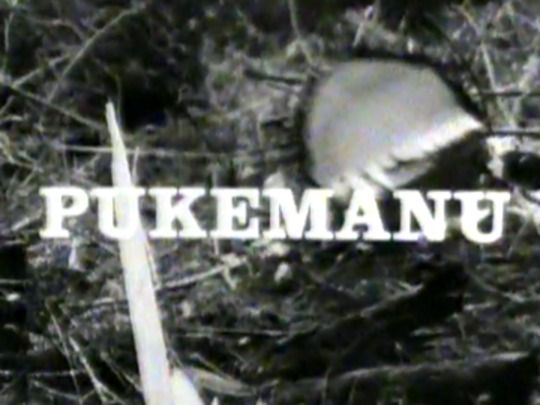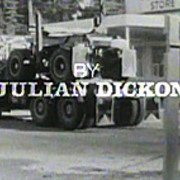
Pukemanu
Television, 1971–1972
Pioneering TV drama
I drove some miles up the Taupō-Napier highway, and turned off right, just before the old Rangatai Pub. The New Zealand Forest service village was called Sixty bar Eight.
In front of the forestry HQ a parade was taking place; a parade that would have given my old Sergeant Major Washington 50 fits. The line-up was about 20 young men. They were all dressed in the same uniform — heavy cleated boots, trousers tucked into thick socks, wool shirt and the whole lot covered in dirty ragged Swandris. I was told off with Jake, the tractor driver, and Hape the tree feller. What was my job? "You are a Breaker-out" the Boss told me. I didn't know what the hell that was, and, since this was my first day, I didn't have the nerve to ask. The frost that morning was hard-white to the top of the trees.
Essentials were gathered. This was the time of the axe and the chain-saw; of the two the axe was king, and there were no hard hats. In our pockets we had saw files, sharpening stones, tobacco, and the inevitable war comic (Commando).
So kitted-out we piled into the bosses' ute. "Dark before us stood the forest"; until we were into the trees. The wind cut like a knife, numbing hands and feet. I was reminded of the foc'sal-head of a first ship up the Saint Lawrence River after winter. Looking back, God knows how I survived it. Once in the trees all sound was gone. Windless silence. It was magic. This was utterly shattered by the big D8 starting up. It settled down to a low rumble, and at that moment I suppose Pukemanu was born.
Many things happened. Slowly the writing took over. The great days of radio were winding down. There was a sunset of really creative writing: Dylan Thomas, McNiece, Beckett were still in the picture. A writer had to aim high and it was all hugely exciting. My days working with the axe and the shot gun were long gone and when Bill Austin, who was then head of Radio Drama, took over Television Drama, there was nothing left in radio, so I went with him.
We moved to Atiamuri. Party line telephone then. 66D. "Are you working?". Bill phoned me and told me they wanted to produce New Zealand's first TV drama series, and had I any ideas? Of course I said yes, but I didn't.
What came to me was sudden and visual. It was a road-side sign " ___ Welcomes You." There were six bullet holes in it. A group of three .303 and three 7x57. Mine. So I wrote what Bill wanted; series outline, character breakdowns, and storylines for three episodes. The first opened on the titles over "Pukemanu Welcomes You" complete with bullet holes. (Pukemanu was not the first name we came up with).
My first idea was a shearing gang, but the forest won out. It was the village that did it, my real feeling was to make it the main character in the series, and that's how it was accepted. Michael Noonan came in right in the beginning as script editor and Hamish Keith as a writer. I have good memories of those early days as we anchored the little monster and got the wind behind us. I may be wrong but I think I wrote episodes one and three.
Pat Evison I had worked with for years in radio and I wrote particularly for her; Ian Watkin was another I asked for and got. I truly loved Pukemanu and the second series, which I had nothing to do with, came as a very painful divorce. But I know now, looking back, that is how things were in those early pioneering times of television drama.
Memories? The awful contracts we had to sign and the miserly payments we had to go begging for. A good one was working with Michael up in Auckland. But perhaps best of all was when we were shooting scenes for Episode One in Atiamuri. They came for tea, Pat sitting on one end of our sofa and Ian on the other. I wouldn't hazard a guess as to what their weight was at that time but it was more than the furniture could bear. I can see my wife's face now as the legs slowly spread outwards and deposited them both of the floor.
I don't wish to be tedious with too much looking back, but there is something I must say. Most of our lives are lived without that one moment. Pukemanu was that for me and still is. It's history now, and I had a part in it, and so had the rest of the actors and production team. I for one am still damn well proud of Pukemanu, and I hope they are too — we earned it the hard way. And after all these years if you no longer can find the magic in the series, then take a walk in the forest and there sit and rest a while and then surely you'll know what we were on about.
Like most of the 'one-off' things in life, it was as simple as that.
- British born Julian Dickon began writing for New Zealand television in the late 1960s. Aside from Pukemanu, he created 1980s TV series Jocko and wrote for kidult show The Sea Urchins. He died in April 2015.
